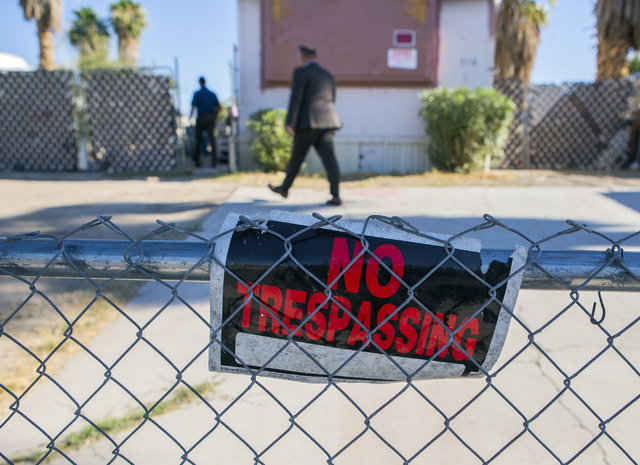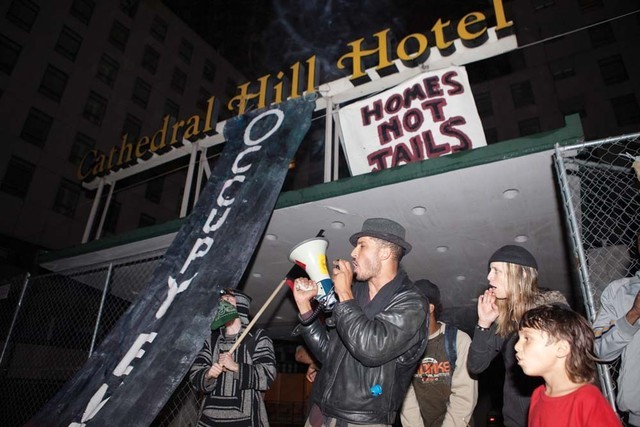Some squat in abandoned homes as survival, others as lifestyle choice
Squatting has roots that trace back to the founding of the United States . The practice of squatting — back then known as homesteading — was essential to forming the nation.
Yet when most people think about modern-day squatters, they think of criminals or crust punk anarchists who are “giving the middle finger” to a capitalist nation.
The reality is, the face of squatters has changed since the Great Recession.
“We’ve seen every class of squatter — from lawyers who know how the foreclosure system works to transients,” said North Las Vegas Police Officer Scott Vaughn, who heads the department’s squatter enforcement unit.
After the Great Recession, many 9-to-5ers were left without jobs. Many left their homes, creating a prime market across the Las Vegas Valley for squatters.
“We’ve seen an equal mix of everyone,” said Matthew Meanea, code enforcement officer for the city of North Las Vegas. “Squatters are really a diverse representation of different economic, social and cultural populations. They really run the gamut. We’ve seen transients that you expect to see in a homeless shelter living inside an expensive home and families you’d expect to see in a nice house squatting in older areas of the neighborhood. It happens everywhere.”
There are different types of squatters, as well.
Commercial squatters occupy the land used for a business without paying rent or taxes; squatter tenants pay rent to the original squatter who acts as a landlord and survival squatters resort to occupying a property as a means of survival.
“Squatting is quite common among homeless youths,” said Arash Ghafoori, executive director of the Nevada Partnership for Homeless Youth. “Our community is severely lacking in beds for the homeless community, especially for the youths. Out on the streets, youths are subjected to becoming victims of sex trafficking, drugs, robbery and other violence. For them, squatting is a means of survival, and it’s what we call a ‘victimless crime.’ They’re not trying to hurt anyone.”
Ghafoori said youths typically squat in abandoned commercial buildings, apartment complexes or rooftops for three to four days to remain hidden. Many come from abusive families, a background of economic poverty or they get kicked out of their homes for their sexuality or gender. Others left the foster care system or had parents who were deported.
Some squatters have stepped up their game, and they’re not looking to squat into any old house — there have been reports of “mansion squatters” in Las Vegas, who try to use the laws to take over luxury homes.
Kevin, who asked to withhold his last name and is a member of the website Squat the Planet — labeled as an online community for “misfit travelers”—, is a 40-year-old, lifelong squatter. He admits to having “champagne tastes” and thus enjoys communities such as Palm Beach, Aspen, the Hamptons and Marin County in California.
“Attempting to survive in the U.S. on less than $2,000 a month is a fool’s gambit,” he said. “The average rent for a single person in a decent neighborhood — meaning no crackheads or shootings — ranges from $2,000 per month in New York City to around $600 in rural areas. Car payments hover around $300 per month, gasoline is roughly $100 per month, groceries are $500, and utilities and internet average $100.
“I decided to avoid the hassle of working at a pointless job just to earn enough money to sustain myself.”
Although Kevin said he has never squatted in Las Vegas, he added that any area that has recently sustained some sort of economic downturn and exodus is perfect for a squatter.
“There are not too many serious challenges for us. Just look on Zillow or the county tax office for abandoned properties. Knowing how Realtors and property managers work, as well as navigating city and county tax records helps immensely,” he said.
Homes Not Jails, a group that advocates using vacant and abandoned housing for the homeless in San Francisco, has been working with the Bay Area community since the ‘90s. “Red,” who asked to withhold his real name, said most people stay between two weeks to two months. He has seen people stay for up to five years, which typically happens with “zombie properties” or properties without a title.
The 31-year-old, self-proclaimed activist added that the organization typically targets bank-owned properties with lock boxes that can easily be opened with a pair of bolt cutters. They then advise squatters to get the keys changed, have their mail sent to the new address and get a form of government identification with the new address on it.
“Our goal is to bring awareness to the fact that there are so many vacant homes everywhere while homeless people are left to die on the streets in front of these same establishments,” he said.
Matthew Derrick, 37, founder of Squat the Planet, said he fell into squatting after his car broke down on a trip from Oregon to California. He was picked up by “very punk rock kids” and began living a vagabond lifestyle.
When he was squatting in New Orleans after Hurricane Katrina, he made sure to introduce himself to nearby neighbors and get their support. Having squatters there deterred criminal activity, he said, such as narcotic labs.
“People jump to the conclusion that squatters are bad people, but squatters are just people like everyone else,” he said. “Most people are looking for some way to get by through squatting and not paying rent. That might help a person get back on their feet and move on and become a regular member of society.”
Visit squattheplanet.com.
To reach North View reporter Sandy Lopez, email slopez@viewnews.com or call 702-383-4686. Find her on Twitter: @JournalismSandy.


















